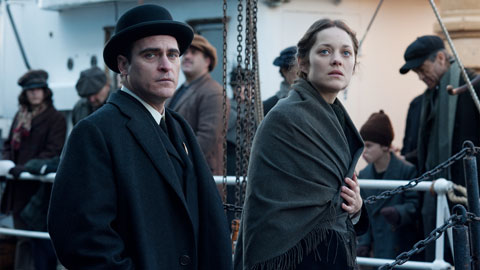Marion Cotillard gets a rough welcome in James Gray’s The Immigrant
By CHRISTOPHER GRAY | June 11, 2014
 FRESH OFF THE BOAT Newly arrived in the United States, Ewa (Marion Cotillard, right) accepts shelter
at the apartment of Bruno Weiss (Joaquin Phoenix). |
The first image in James Gray’s new film, The Immigrant, is a less-observed aspect of American iconography: the rear side of the Statue of Liberty, greeting incoming boats with attendant promises of freedom and a purely theoretical flame of light. When we next encounter Lady Liberty, she is a burlesque dancer on a tiny stage, played by Marion Cotillard. Fearful and objectified, she holds her torch low, as if it’s a weight she can’t bear.
In a more traditional historical drama, this moment would land as literal, heavy-handed symbolism, but Gray specializes in making intensely localized New York melodramas out of familiar genre setups. His crime films — 2007’s We Own the Night and The Yards (2000) — are distinguished by their familial dynamics: ailing parents and estranged brothers are plot points as potent as drug-running and criminal corruption. Gray’s last effort, the romance Two Lovers (2008), is as much about identity and social status as it is about a depressive man in a love triangle. The Immigrant, similarly, seamlessly folds elements of New York history and the American promise into a story about the varieties of captivity and loyalty.
Cotillard’s Ewa arrives at Ellis Island from Poland with her sister, Magda (Angela Sarafyan), who is stricken with tuberculosis and detained in an infirmary. Ewa, falsely branded as a woman of low morals, only escapes the island under the patronage of Bruno Weiss (Joaquin Phoenix) and the “Travelers Aid Society.” Penniless and unable to find her emigre aunt and uncle, Ewa accepts shelter in Bruno’s apartment, and is drawn into his social and professional circle. (As in other Gray films, the two are indistinguishable, and radiate a palpable, lived-in sense of community.)
Bruno, it turns out, is a pimp in the guise of a theater producer. (His ladies dance in a club serving alcohol during prohibition.) Speaking with rehearsed courtliness, he refers to his employees as his doves; they live amid one another in a couple of communal Manhattan apartment buildings. Ewa’s reluctance to join the business is only exceeded by Bruno’s — he is rather clearly in love with her — but financial concerns outweigh their reluctance. Ewa needs money to secure her sister’s release, and Bruno sees a beauty he can sell at a high price. This sacrifice of pride and purity is, in The Immigrant, the cost of the American promise: ideals are sold off for the chance to perhaps earn them back later. As Ewa attempts to claw her way back to hope and respectability after the arrival of a potential white knight — Bruno’s cousin, a magician named Orlando (Jeremy Renner) — Bruno’s patronly formality withers into an erratic despair. Their increasingly codependent relationship is reduced to increasingly humiliating circumstances as Bruno pawns off larger parcels of his pride.